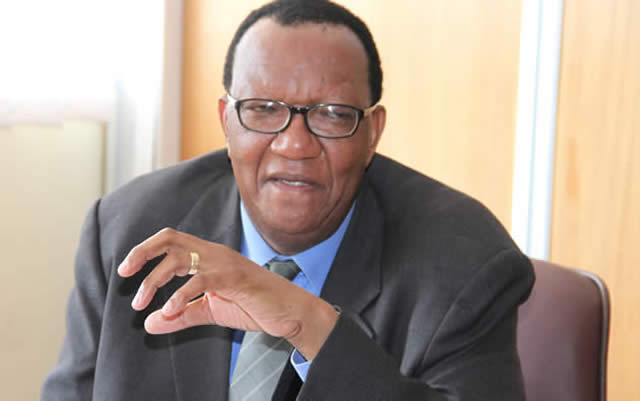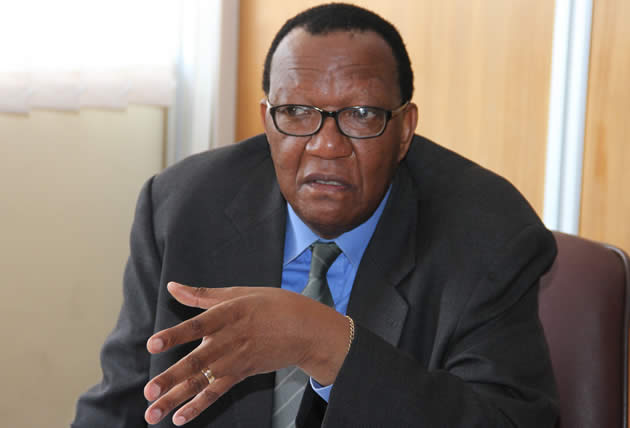Drought relief gets underway

Zvamaida Murwira Senior Reporter—
Government will today start distributing drought relief grain to families in various rural districts in almost all provinces which were affected by poor yields due to the low rains recorded last season. The deficit of 700 000 tonnes of grain is being addressed through importation from a number of countries by both Government and the private sector.
Related……
- Sadc on drought alert
- Agriculture: Irrigation should be the buzzword
- The Interview: Drought a threat to economy
- Tricky rainfall season beckons
- Climate change, land under-utilisation threat to agriculture
- Plan for drought every year, Met Dept warns
- Agric season poised for major rebound
The drought relief programme coincides with the distribution of inputs under the Presidential Inputs Scheme which also starts this week in time for the summer cropping season. Both programmes are being co-ordinated by the Ministry of Agriculture, Mechanisation and Irrigation Development and Public Service, Labour and Social Welfare which will be assisted by Provincial Affairs Ministers.
According to the second crop assessment results carried out recently, Masvingo was the worst affected among the rural provinces, while Mashonaland Central had a surplus of 76 000 tonnes and Mashonaland West had a surplus of 54 000 tonnes. Masvingo requires 131 000 tonnes, Manicaland 96 000, Midlands 93 000, Matabeleland South 61 000, Matabeleland North 46 000 and Mashonaland East 44 000.
For the two urban provinces, Harare requires 236 000 tonnes, while Bulawayo requires 72 000. Most Provincial Affairs Ministers yesterday said structures for the distribution of grain were already in place. Agriculture, Mechanisation and Irrigation Development Minister Dr Joseph Made said all was in place for the distribution of the grain through the Grain Marketing Board.
“We are moving grain to all depressed areas,” he said. “It is being done by my ministry and the Public Service, Labour and Social Welfare Ministry through the GMB. “We have already started moving the grain to provinces and we are now going to districts and wards to assist people even in the most remote areas to avert hunger. It was through Cabinet authority for the ministry to start moving grain. Each province will get quantities that are in accordance with the severity of the hunger. Our priority are vulnerable families.”
Minister Made said there would be two categories of beneficiaries – the vulnerable that will get vouchers from the Department of Social Welfare to access the grain and some who would be asked to buy at subsidised prices. Mashonaland West Provincial Affairs Minister Faber Chidarikire said they will start with the worst hit areas in the distribution of grain.
“We are meeting on Monday (today) to finalise the logistics,” he said. “We will start with Kariba because that is the most affected district. “I have just received the circular from our principals on grain distribution and on Monday we will sit down with everyone to see how we can distribute it.” Masvingo Provincial Affairs Minister Shuvai Mahofa said the province ranked among the worost affected areas by the drought.
“There are some people who did not harvest anything last season,” she said. “We have several districts that have been affected like Gutu, Chivi, Chiredzi and Mwenezi. We want to thank the Government for moving in to help the people. The situation has been bad because of poor harvests by most families.” Manicaland Provincial Affairs Minister Mandi Chimene said they were ready to distribute grain to the districts and wards.
“We have our people on the ground carrying out preparatory work,” she said. “I will be getting feedback tomorrow (today) when we meet as a province to start grain distribution.” Some of the most affected areas in Manicaland province included Buhera, Mutasa, Chimanimani, Chipinge and Makoni. Midlands Provincial Affairs Minister Jaison Machaya said they were ready for the distribution.
“We are being assisted by the Ministry of Public Service, Labour and Social Welfare,” he said. “We have districts like Zvishavane and Mberengwa that perennially have food shortages, while other districts like Gokwe managed to have some harvests, but people are now exhausting their yields.” Speaking in Gwanda on Friday, Acting President Emmerson Mnangagwa said grain imported from Zambia had been delivered to Bulawayo and was ready for distribution to areas affected by drought.
He was speaking at a briefing with Government officials from various departments, service chiefs and traditional leaders at Joshua Mqabuko Nkomo Polytechnic College in Gwanda where he had come for a constitutional advocacy meeting. Acting President Mnangagwa said Government would distribute the maize according to demand.
“The President himself has said as a party and as a Government, we shall not allow anyone to die from hunger, but the burden of identifying families or areas that are hard hit, families which should be given priority to receive food cannot be known by me at headquarters,” he said. “We have structures at the ground level from the Government side, we have village committees, ward, district, province, that chain should send information.” Acting President Mnangagwa said the ruling Zanu-PF party had established structures to relay the information, while churches and civic society could also assist with the required information.
“For instance, I’m aware and I think my colleague here Cde SK Moyo knows that all the maize that we bought in Zambia is in Bulawayo,” he said. “It has all come, but it will require the leadership in Matabeleland North, Matabeleland South and Bulawayo to identify critical areas that have been affected by drought. We also have strategic grain reserves and again we need information on food requirements.”
Acting President Mnangagwa said some provinces registered good harvests and some of the grain from these areas should be moved to needy areas.
Presenting the fiscal policy statement recently, Finance Minister Patrick Chinamasa told Parliament that Government had already imported about 16 670 tonnes of grain which would go a long way in supporting vulnerable households.
In addition, he said, Government issued permits for the importation of 819 704 tonnes of maize by grain merchants and against the permits, the private sector had so far imported about 101 716 tonnes.










Comments